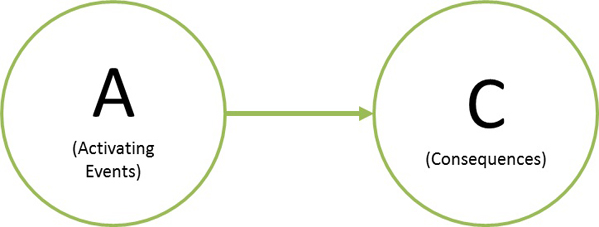
Cognitive Behavioral Therapy
Overcoming Impatience
Good therapists are always skeptical of and make sure to challenge comments like “He makes me so angry,” “She gets under my skin,” or “He makes me lose my patience.” People who think this way see the world and their relationships in terms of cause and effect, action and reaction, neglecting the vital intermediate stage of perception, which is the focal point of cognitive behavioral therapy. Here is a schematic we have used in a few other articles that shows the difference between how most people see the world and how CBT therapists see it.
When you are feeling impatient with someone, it’s easy to pass the buck and place the responsibility squarely on his or her shoulders. But while this strategy might make you feel better about losing your cool it is a poor life solution because it ends up limiting your freedom. The person making you impatient is in actuality just putting stimuli out there in the environment, and like all stimuli, you have the opportunity to interpret it and respond to it as you see fit. Otherwise you are like a leaf blowing in the wind, subject to the whims of those around you, tossed to and fro without having any say in the matter.
You are the only person who truly has the power to make you angry or impatient if you think in terms of perception instead of cause and effect, and this is a very good thing. Your sense of power and efficacy instantly increase. You gain a weapon against stress since you realize that you have the opportunity to interpret stressors from your environment the way you choose.
The first thing to do if you find yourself impatient with others is to take the responsibility back and realize that your impatience is yours alone, however trying the people around you may be. Centering yourself in the moment using mindful breathing before an encounter with anyone who has been getting under your skin of late is a great way to help you stay calm and focused during the conversation and to remind yourself that you are responsible for your own emotions.
The biggest thing to realize is that you are only hurting yourself by blaming your impatience on someone else because not only do you feel ruffled and unhappy but physiologically you are also telling your brain to release harmful stress hormones into your body.
Staying calm, relaxed, and patient in the face of stressors created by our work colleagues, family members, friends, and acquaintances is an ideal to strive towards. None of us can be successful all the time. But if we can just think in terms of centering our impatience where it belongs, in us, the whole paradigm shifts and a path opens up. When we think it belongs to those around us there is little we can do to change the situation except hit our heads against the wall as we try in vain to change the behavior of others.






